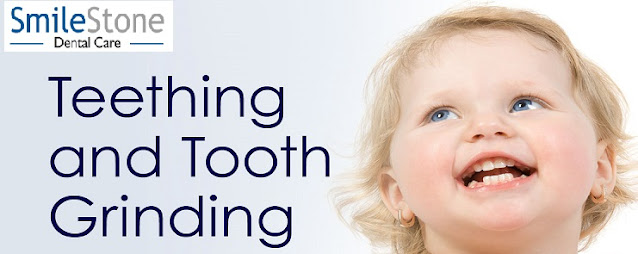Reasons Why Your Baby is Grinding Their Teeth?
Bruxism,
or teeth grinding, can cause jaw pain, tooth deterioration (including
fractures), and sleep disruption as early as the first birthday.
Caffeine-containing foods and beverages (such as chocolate, iced tea, cola,
etc.) as well as pain from an ear infection or teething can cause it. The
improper alignment of your child's teeth, or malocclusion, is another
contributing factor. Smilestone- Best Dental Clinic in Nagpur will give you the solution
Why Do People Bruxism?
•
Children may grind
their teeth for a variety of causes, such as:
•
Teeth that aren't
correctly aligned
•
Discomfort, such as
earaches or teething pain
• Stress, such as that
brought on by anxiety about an exam or a change in routine. Stress levels can
be high enough to result in teeth grinding or jaw clenching, even when parents
and siblings are bickering.
• Medications, such as hyperactivity, cerebral palsy, or other medical conditions; It's unlikely to harm the teeth because most children who grind their teeth quit before they lose all of their baby teeth. If you are concerned, talk to your child's dentist and let their doctor know. To safeguard children's teeth, dentists will occasionally recommend mouth guards. Ibuprofen or acetaminophen 30 minutes before to bedtime may be advised by your doctor if the tooth grinding is brought on by teething or an ear infection (it takes a little time to work).
The first sign that your baby may have bruxism is likely to be loud grinding at night or during naps. When your kid is awake during the day, you can also catch them grinding their teeth or making minor jaw movements. Smilestone offers Best Orthodontist in Nagpur
Some widespread signs
that your child may have bruxism include:
• Loud clicking or
grinding noises, particularly at night or during your child's nap.
• Regular jaw tightening
or clenching movements.
· Cold or hot food
sensitivity in the teeth, which could make your child scream at mealtimes.
· Tooth damage.
· Gum enlargement.
Problems caused by Bruxism
It
can be difficult for you to tell if your infant is bruxing when they are
asleep. Your baby's teeth can be examined by a paediatric dentist to look for
any signs that bruxism might be taking place. The following are some of the immediate
and long term effects of baby bruxism:
· Headaches: Your infant
may feel pain in or near the ear region.
· Muscle aches: When you
clench your jaw, pressure builds up inside your muscles, causing soreness and
stiffness.
· Temporomandibular joint
dysfunction (TMD): This condition makes it more difficult to chew or completely
open the mouth because it causes jaw pain and stiffness. Long-term, frequent
teeth grinding can cause TMD in children.
· Teeth that have been
chipped are at danger of breaking if your kid continues to clench and grind
their teeth after wearing down the enamel.
· Tooth sensitivity:
Grinding your teeth speeds up the deterioration of enamel. Your child's teeth
may become more sensitive to both heat and cold as a result.
When to Contact Your
Physician
Anytime
you have a worry about your baby's health, get in touch with your
paediatrician. The majority of teeth grinding is minor and has no lasting
impact. However, keep an eye out for any changes in your baby's dental health.
Report any irritability that might be brought on by earaches, jaw pain, or other clenching-related soreness.Dr.Arvind Ashtanakr is the Best Dentist in Nagpur
For more details we
are just a call away Contact us on – 9823154023,Visit our website- www.smilestonedentist.com




Comments
Post a Comment